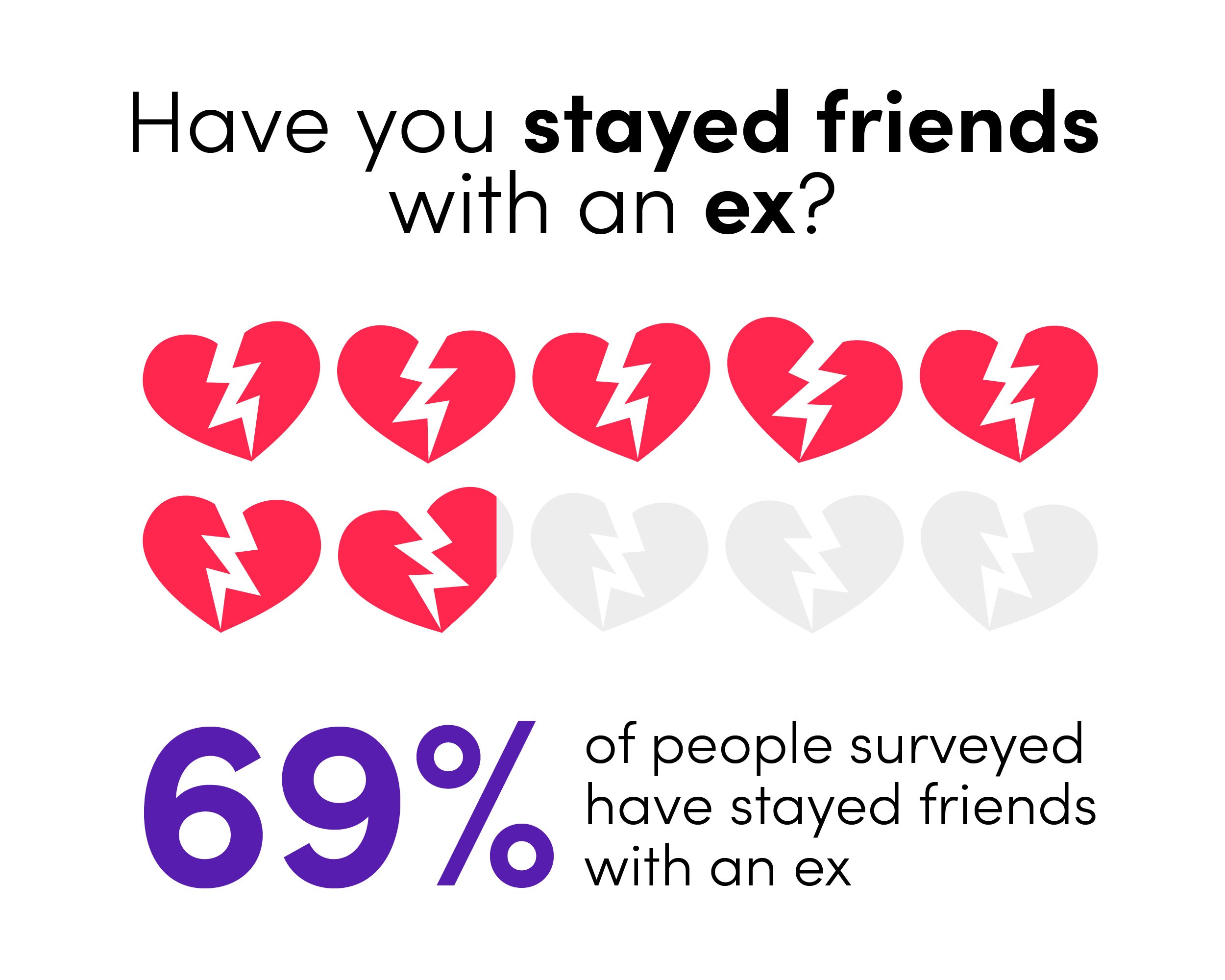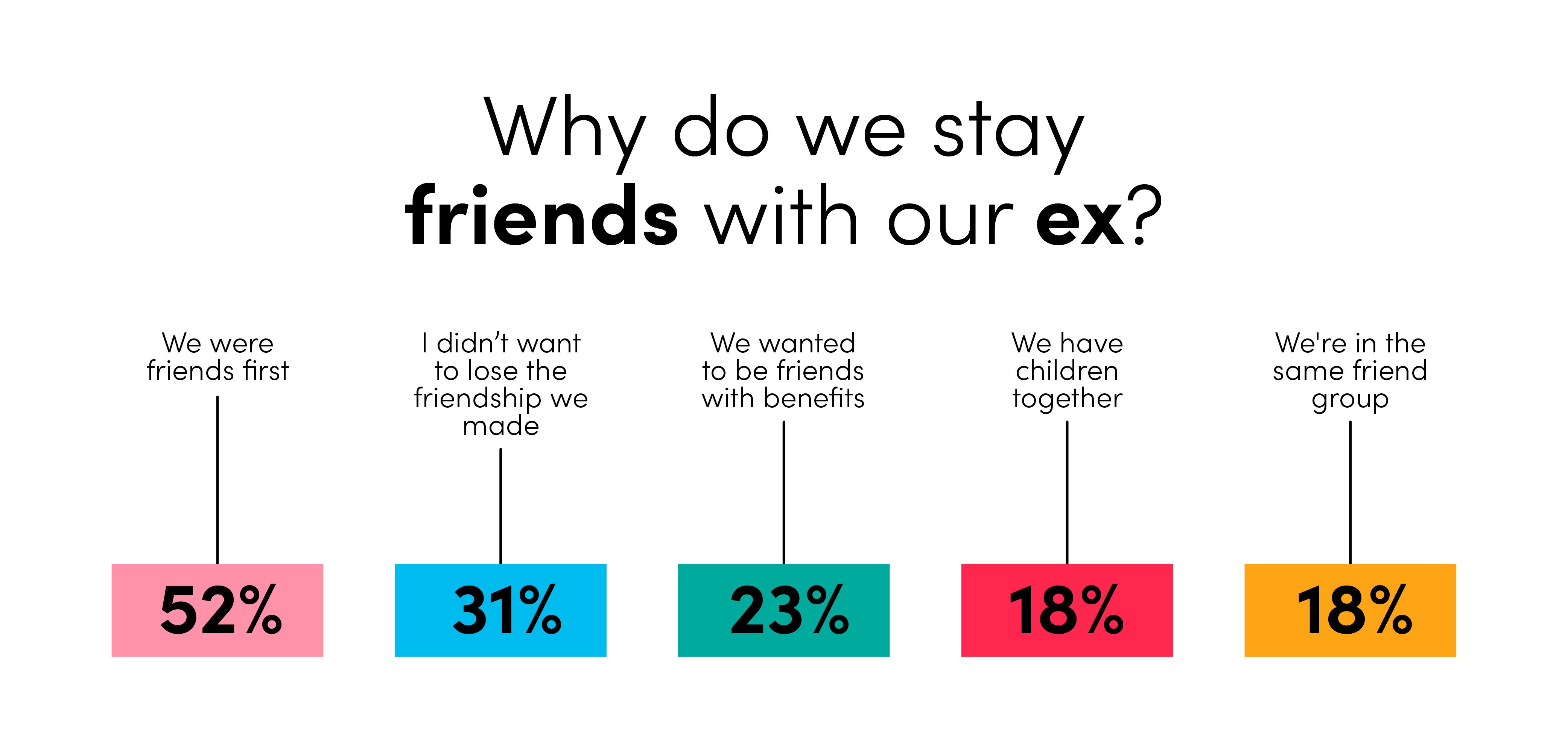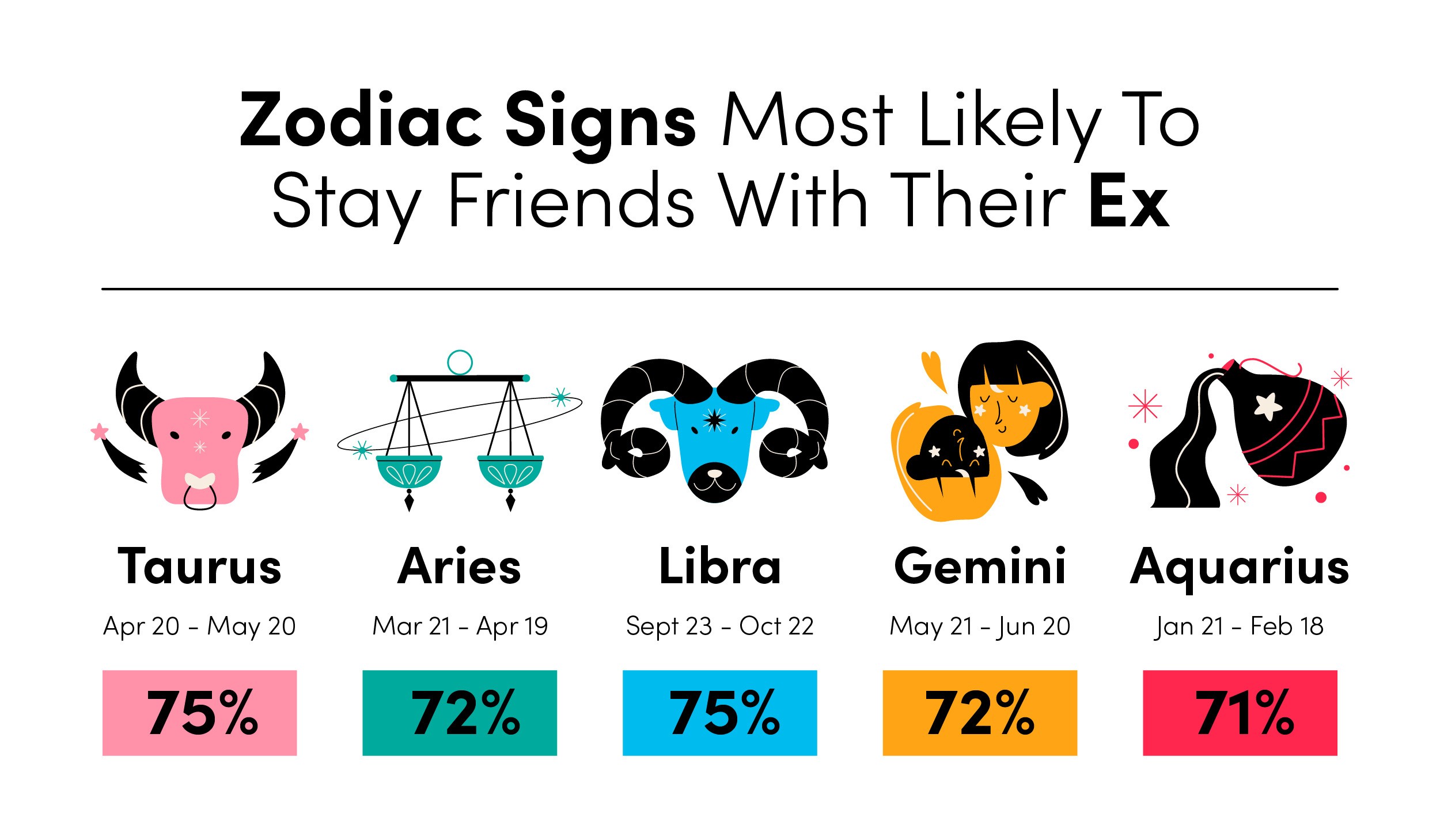Can You Stay Friends With Your Ex?
on Jan 10, 2023
Sixty-nine percent of people have stayed friends with an ex, but is it a good idea?
Anyone who’s been in a relationship that didn’t work out knows how difficult it can be to navigate the aftermath of a breakup. Do you cut your ex-partner off completely so you have space to heal? Or do you try to keep on good terms so you don’t feel like you’re completely losing them from your life?
It’s not surprising that many of us find it hard to lose exes from our lives completely after being so intimate, but is it possible to stay friends with them? And most importantly - is it healthy?
We’ve surveyed over 2,000 adults over the age of 18 to find out just how many have attempted to remain friends with their ex, why they wanted to stay on good terms, and whether the friendship thrived or failed. Additionally, we’ve spoken to relationship experts about the potential benefits and drawbacks of keeping your ex in your life, to try and decide once and for all whether it’s ever a good idea.
How many of us stay friends with an ex?
At one point or another, we found that 69% of adults have stayed friends (or at least on good terms) with an ex post-breakup. This rises to 71% for men specifically, who were found to be the most likely to keep things friendly with an ex. Meanwhile, non-binary people were least likely to keep an ex in their lives, with just 57% saying they’d struck up a friendship with a previous partner.

Additionally, we found that those aged 45-54 were the most likely to remain friends with their ex, with three in four (74%) admitting that they’ve tried. On the other hand, those aged 18-24 have been named the most likely to simply cut off their ex, with 42% remaining hostile with their ex-partner.
Why do we stay friends with our exes?
It’s pretty clear that a lot of us are keen to try and keep things amicable after we put a stop to a romance, but why is this?
Well, according to over half of respondents (52%), the main incentive to keep an ex around is because they had a friendship before becoming romantically involved and not wanting to lose that.
This reason was particularly popular for those identifying as non-binary (88%), as well as for women (54%). However, for almost three in 10 men (29%), the idea of cutting off contact with an ex wasn’t desirable because they were sexually compatible and wanted to revert to a friends-with-benefits-style relationship.

When it comes to remaining friendly for the sake of children, we found that women were more likely to stay friends with an ex, with 22% selecting this as a reason, compared to only 14% of men. Parenting is easier when there are no hard feelings there, so this is one situation where trying to remain friends may be the healthiest option.
Which star signs are most likely to stay friends with an ex and why?
Tauruses are known for being a fiercely loyal sign, so it may not be surprising that our survey found Taureans are more likely than any other sign to keep an ex in their lives (75%). Librans (who value harmony and partnership) came a close second with 74% saying they’ve stayed friends with an ex, followed by Aries and Gemini.

Scorpio is a famously sexual sign, so it comes as no surprise that they’re the sign most motivated to remain friendly due to sexual compatibility (35%). This is followed by 30% of Virgos also claiming they stayed on good terms for the same reason. Geminis on the other hand were found to be the most likely to keep their ex around because they shared their kinks and fetishes (17%).
On the other end of the spectrum, Leo is the sign most likely to remain on good terms with an ex for their child’s sake (22%), and Sagittarius is the most likely to consider their ex’s feelings and become friends with their ex due to being in the same friendship group and wanting to avoid any friction (21%).
One in six of those who stayed friends with an ex say the friendship was unsuccessful
So when it comes down to it, are friendships with an ex ever successful? The majority of people (84%) said yes. However, the exact type of friendship people have seems to vary.
The most common type of relationship people have with their ex is one where they’re still friends but they no longer have sex (56%). However, we found that men are most likely to maintain a ‘friends with benefits’ type sexual relationship with their exes - 17% compared to 11% of women and 0% of those identifying as non-binary.
Based on our survey, it seems that not all of us can claim to have successfully navigated a friendship with an ex. We found that women were slightly more likely than other genders to consider the friendship a failure, the most common reason being that the problems from their romantic relationship carried over into the friendship (7%). As the saying goes, a leopard can’t change its spots, so things that bothered you about your partner whilst you were romantic will likely continue to be a problem even if you keep things platonic.
Perhaps the most surprising finding from the survey is that the least common reason for the friendship failing was ‘too many unresolved feelings.’ Only 4% of people selected this option, suggesting that in reality lingering feelings just aren’t as much of an issue as we think when it comes to staying friends with an ex.
What are the benefits, and drawbacks, of being friends with an ex?
Everyone has a different opinion and motivation for keeping an ex in their life. But are there any real benefits and drawbacks of doing this?
We spoke to Psychotherapist Rachel Wright (MA, LMFT), who specializes in modern relationships, mental health and sex to gain some insight:
“There are tons of benefits to being friends with an ex-partner. In fact, it's called de-escalating the relationship. We tend to start any relationship as friends, even if we're dating with an intent to be in a romantic relationship: the foundation is the same - a friendship/relationship.
“So, when we build a good foundation with someone and then escalate into a romantic and/or sexual relationship - if that piece doesn't work out, it can feel terrific to get to a comfortable spot within that foundation instead of throwing away the whole thing. In non-monogamy, and even more specifically polyamory, it's super common for relationships to escalate and de-escalate; but in monogamous relationships, often, when the romantic and/or sexual piece 'ends', so does the entire relationship. IT DOES NOT HAVE TO BE THIS WAY.
“However, some people find hardship in continuing to have or grow a relationship with someone they've been romantically involved with because of grief, hurt, resentment, or other icky feelings. I recommend taking 60 days after your break-up and not talking to or seeing each other. Then, after you've gone through the grief and processed the shift in your relationship, you can decide with a much clearer head what you want - and your ex-partner can do the same. Pushing yourself to continue to be in a relationship with someone who you don't want in your life anymore isn't good.”
How to know when it’s time to end a friendship with an ex
As Rachel says, it can feel great to get to a comfortable place with an ex-partner if the romantic relationship doesn’t work out, but is it always the best thing to do? Rachel has shared some advice on how to know when it truly is time to remove an ex from your life.
“If you are feeling the desire not to have this person in your life anymore, or you're feeling more hurt/pain/grief about having this person in your life versus not, it may be time to re-think any sort of relationship with them.
“Try to think about all relationships as relationships - friendships are relationships, partners are relationships, our family members we have relationships with - a relationship isn't synonymous with romance and sex. So, you get to decide what type of relationship you have with this person and IF you want them in your life, to begin with.
“If you've tried and aren't sure, take the 60 days I recommend post-break-up again and re-assess. And, if you are sure, let the person know. Don't keep them around just to ghost them or ignore them.”
Methodology:
Data is based on a survey we conducted in August 2022 of 2,008 people over the age of 18.
The expert commentary was provided by:
Rachel Wright, psychotherapist (MA, LFT) specializing in modern relationships, mental health and sex
